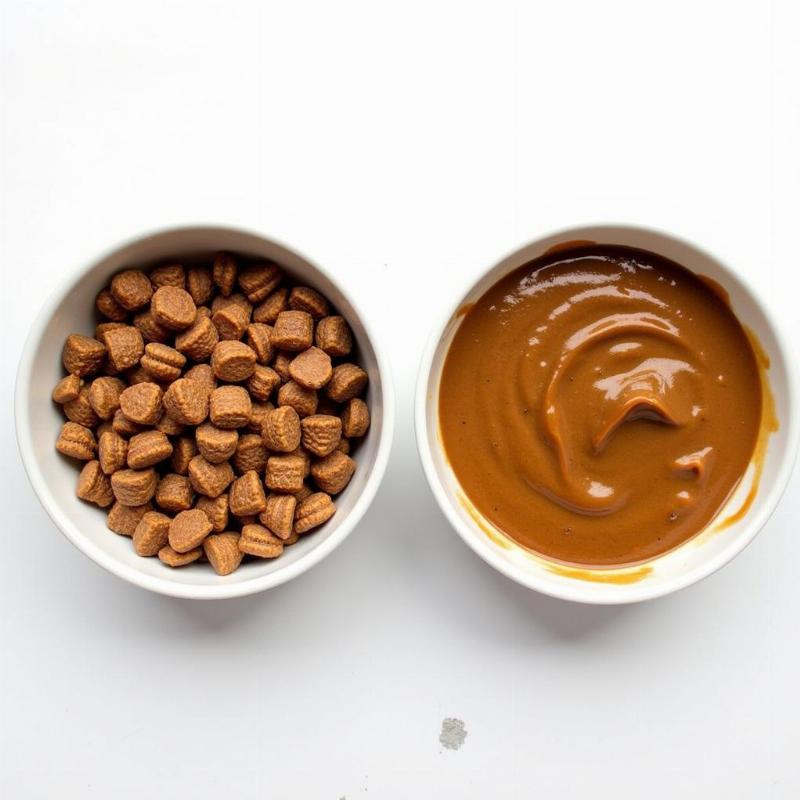Choosing the right food for your Boxer puppy is crucial for their growth, development, and overall well-being. A balanced diet fuels their playful energy, supports strong muscle development, and ensures a healthy coat and skin. With so many dog food options available in the US, finding the best one for your Boxer puppy can feel overwhelming. This guide will help you navigate the world of puppy nutrition and provide you with expert advice on selecting the perfect food for your energetic companion.
Understanding Boxer Puppy Nutritional Needs
Boxer puppies are known for their boundless energy and playful nature. This means they need a diet that can keep up with their active lifestyle. A high-quality puppy food formulated for large breeds is essential. Look for a food with a balanced ratio of proteins, fats, and carbohydrates. Protein provides the building blocks for strong muscles, while fats supply energy and support healthy skin and coat. Carbohydrates offer another source of energy and aid in digestion.
Remember, Boxer puppies are also susceptible to certain health issues, including hip dysplasia and heart conditions. Choosing a food enriched with glucosamine and chondroitin can support healthy joint development, while taurine is crucial for maintaining heart health.
Key Ingredients to Look for in Boxer Puppy Food
When reading dog food labels, prioritize whole meat sources like chicken, beef, lamb, or fish as the primary ingredients. Avoid foods with fillers like corn, wheat, and soy, as these offer little nutritional value and can cause digestive upset.
Essential fatty acids like omega-3s and omega-6s are crucial for a Boxer puppy’s skin and coat health. Look for foods that include sources of these healthy fats, such as fish oil or flaxseed. Antioxidants, like vitamins E and C, also play a vital role in supporting a healthy immune system and protecting against cellular damage.
Feeding Schedule and Portion Control for Boxer Puppies
Establishing a regular feeding schedule and practicing portion control are just as important as choosing the right food. Overfeeding can lead to obesity, which can exacerbate health issues like hip dysplasia. Consult your veterinarian to determine the appropriate portion size for your Boxer puppy based on their age, weight, and activity level. Most Boxer puppies will thrive on being fed three to four times a day until they reach six months of age, at which point you can transition to feeding them twice a day.
Dry Food vs. Wet Food for Boxer Puppies
Both dry and wet food have their pros and cons. Dry food is typically more affordable and convenient to store, while wet food often has a higher moisture content, which can be beneficial for puppies prone to dehydration.
 Bowls of dry and wet dog food
Bowls of dry and wet dog food
Ultimately, the best choice depends on your puppy’s individual preferences and needs. Some owners choose to combine dry and wet food to provide a variety of textures and flavors.
Transitioning to Adult Dog Food
As your Boxer puppy matures, you’ll eventually need to transition them to adult dog food. This should be done gradually to avoid digestive upset. Start by mixing a small amount of adult food with their puppy food and gradually increase the proportion of adult food over a period of 7-10 days.
Conclusion: Making the Best Choice for Your Boxer Puppy
Feeding your Boxer puppy a high-quality, balanced diet is a crucial investment in their long-term health and happiness. By understanding their specific nutritional needs and following the tips outlined in this guide, you can ensure your energetic companion receives the nourishment they need to thrive. Remember to consult your veterinarian for personalized advice based on your puppy’s individual circumstances.
FAQ:
- How much should I feed my Boxer puppy? Consult your veterinarian for guidance on appropriate portion sizes, as it depends on factors like age, weight, and activity level.
- What are some common signs of food allergies in Boxer puppies? Look for skin irritations, digestive upset, and ear infections.
- When should I switch my Boxer puppy to adult food? Generally, around 12-18 months of age. Consult your vet for specific recommendations.
- Can I give my Boxer puppy supplements? Talk to your vet before adding any supplements to your puppy’s diet.
- Is it okay to give my Boxer puppy table scraps? Avoid feeding your puppy table scraps, as many human foods are toxic to dogs.
- How can I tell if my Boxer puppy is getting the right nutrition? A healthy Boxer puppy will have a shiny coat, bright eyes, healthy weight, and plenty of energy.
- What should I do if my Boxer puppy refuses to eat their food? Consult your veterinarian to rule out any underlying medical conditions and discuss potential solutions.
Introducing Beautdogs.us: Your Trusted Source for Boxer Puppy Care
Beautdogs.us is your premier destination for comprehensive Boxer puppy care information, expert advice, and a curated selection of top-quality products and services. Whether you’re a first-time Boxer owner or a seasoned enthusiast, we provide authoritative yet accessible resources to help you navigate every stage of your puppy’s journey. From breed-specific nutrition guides to training tips and healthcare advice, Beautdogs.us empowers you to provide your Boxer puppy with the best possible care. Connect with our team of experts via email at [email protected] or call us at +1 501-555-7529 to learn more about how we can support you in raising a happy and healthy Boxer puppy.